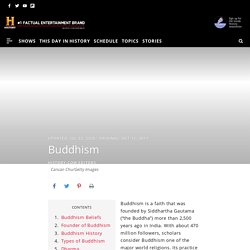

Islam - Five Pillars, Nation of Islam & Definition. Islam is the second largest religion in the world after Christianity, with about 1.8 billion Muslims worldwide.

Although its roots go back further, scholars typically date the creation of Islam to the 7th century, making it the youngest of the major world religions. Islam started in Mecca, in modern-day Saudi Arabia, during the time of the prophet Muhammad’s life. Today, the faith is spreading rapidly throughout the world. Islam Facts The word “Islam” means “submission to the will of God.”Followers of Islam are called Muslims.Muslims are monotheistic and worship one, all-knowing God, who in Arabic is known as Allah.Followers of Islam aim to live a life of complete submission to Allah.
Muhammad The prophet Muhammad, sometimes spelled Mohammed or Mohammad, was born in Mecca, Saudi Arabia, in 570 A.D. According to Islamic texts and tradition, an angel named Gabriel visited Muhammad in 610 A.D. while he was meditating in a cave. Hijra Abu Bakr Caliphate System Sunnis and Shiites Quran Sharia Law. The Secret History of Muslims in the U.S.
Watch: How people respond to Bible quotes when told they're from the Quran. People make a lot of assumptions about Islam compared with Christianity and Judaism — particularly that it's more inherently violent.

But do people really know what they're talking about, or are they simplifying complicated belief systems to make a political point? The team at Dit Is Normaal decided to put this to the test in the Netherlands, where they're based. So they disguised a Bible as a Quran, read verses from the Bible (such as "You will have to cut off her hand"), and asked people for their thoughts. People by and large reacted with a lot of "othering" of Muslims — making remarks like, "If you've been raised with this book and these kinds of thoughts, it's going to influence the way you think.
" Then they found out the verses came from the Bible, not the Quran. The general lesson here isn't that all religions are bad and everyone should feel bad. If you read the Bible front and back, you will read about several ideas that frankly don't mesh with modern Western standards. Judaism: Founder, Beliefs & Facts. Judaism is the world’s oldest monotheistic religion, dating back nearly 4,000 years.

Followers of Judaism believe in one God who revealed himself through ancient prophets. The history of Judaism is essential to understanding the Jewish faith, which has a rich heritage of law, culture and tradition. Judaism Beliefs Jewish people believe there’s only one God who has established a covenant—or special agreement—with them. Their God communicates to believers through prophets and rewards good deeds while also punishing evil. Most Jews (with the exception of a few groups) believe that their Messiah hasn’t yet come—but will one day. Jewish people worship in holy places known as synagogues, and their spiritual leaders are called rabbis. Today, there are about 14 million Jews worldwide. Torah The Jewish sacred text is called the Tanakh or the “Hebrew Bible.” Buddhism - Definition, Founder & Origins.
Buddhism is a faith that was founded by Siddhartha Gautama (“the Buddha”) more than 2,500 years ago in India.

With about 470 million followers, scholars consider Buddhism one of the major world religions. Its practice has historically been most prominent in East and Southeast Asia, but its influence is growing in the West. Many Buddhist ideas and philosophies overlap with those of other faiths. Buddhism Beliefs Some key Buddhism beliefs include: Followers of Buddhism don’t acknowledge a supreme god or deity.
Christianity - Dogma, Definition & Beliefs. Christianity is the most widely practiced religion in the world, with more than 2 billion followers.

The Christian faith centers on beliefs regarding the birth, life, death and resurrection of Jesus Christ. While it started with a small group of adherents, many historians regard the spread and adoption of Christianity throughout the world as one of the most successful spiritual missions in human history. Christianity Beliefs Some basic Christian concepts include: Christians are monotheistic, i.e., they believe there’s only one God, and he created the heavens and the earth. Who was Jesus? Most historians believe that Jesus was a real person who was born between 2 B.C. and 7 B.C. According to the text, Jesus was born to a young Jewish virgin named Mary in the town of Bethlehem, south of Jerusalem in modern-day Palestine. Very little is known about Jesus’s childhood.
Jesus was raised Jewish, and according to most scholars, he aimed to reform Judaism—not create a new religion. Jesus’s Teachings.